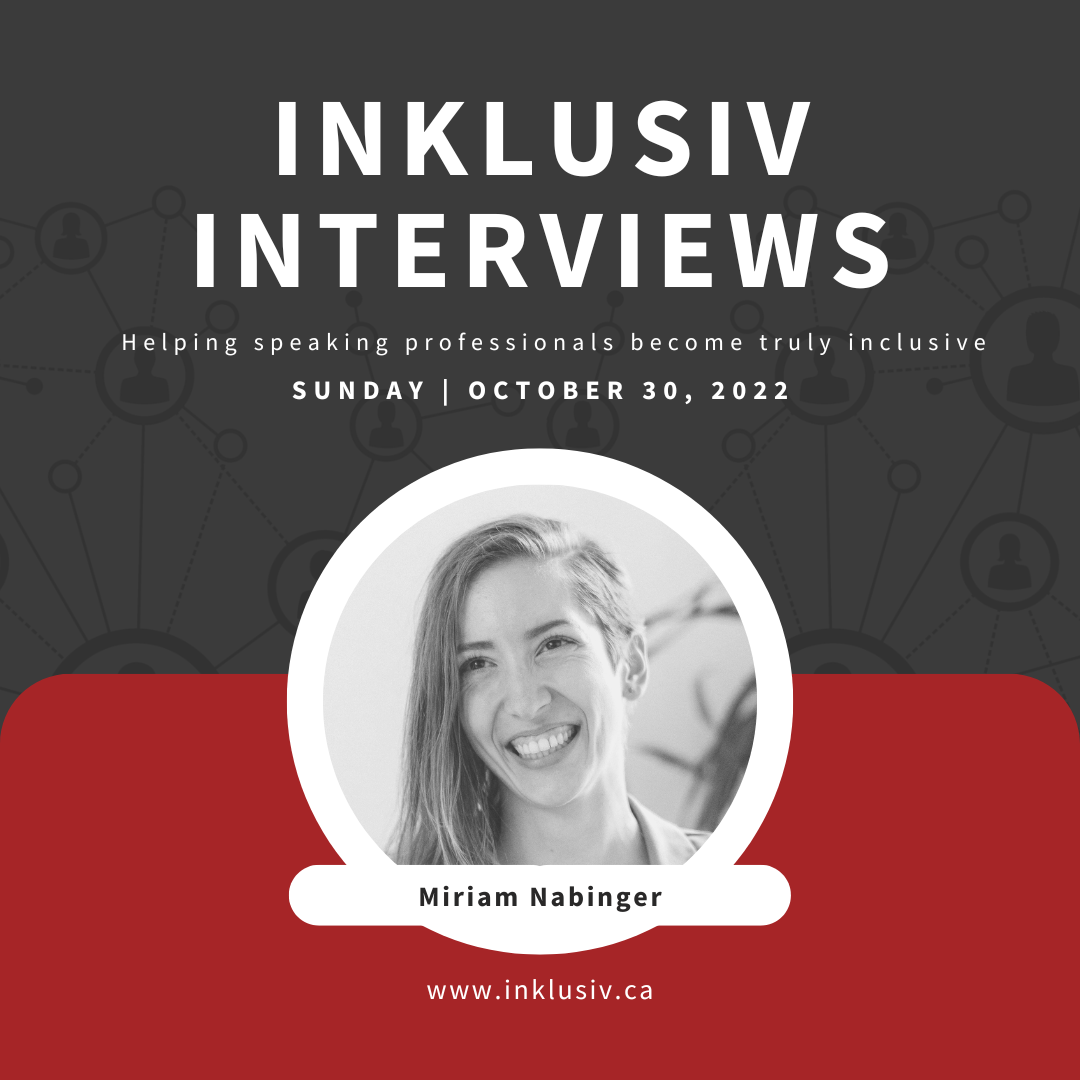Interview with Miriam Nabinger

Every week, we meet with audience members with disabilities who are willing to come forward and share a little bit about their own personal journey and experiences, attending live, in-person, or virtual speaking or training events. Through their unique and generous perspectives, speakers, trainers, facilitators, and other communication professionals can hopefully learn about some of the things that they do well, but also (and maybe more importantly) about some of the things they could improve to provide an experience that is truly inclusive of everyone.
Meet Miriam, an audience member who has generalized anxiety disorder and depression
So, without further ado, let’s dive right into this week’s interview with Miriam Nabinger (she/her). Miriam has generalized anxiety disorder and depression, and comes to us from Vienna, Austria.
Introductions
QUESTION 01 Can you tell us a bit about yourself, and how your disability might impact your experience, as someone who attends live in-person and virtual events?
My name is Miriam Nabinger, and I’m a digital accessibility trainer for businesses and product teams. My mission is to empower other people to create inclusive products. I would love to be more present as a speaker as well. I have Generalized Anxiety Disorder and Depression, which have accompanied me for many years.
When attending events, the booking of the event is probably my biggest obstacle. It takes me a while to actually buy a ticket, as I overthink if I’m ready to go, and days before I might rethink my decision again and potentially cancel because I’m so stressed. Once I’m at the event, I’m nervous, socializing with individuals is fine with me – I like meeting new people – but going out to groups of people I don’t know is really hard. I am very sound sensitive, so if the live venue isn’t in a good, isolated place, I will leave early as it’s making me feel uncomfortable.
I talk pretty fast, but if I’m a speaker and nervous this gets worse – which might make understanding difficult.
Things that ruin the experience
QUESTION 02 Thinking back on some of your experiences attending in-person or virtual events, what are some of the worst things speakers, trainers, and other communication experts can do to ruin your experience as an attendee?
If the whole conference has topics that only consist of doom and gloom, I’m not going to have a good time.
Speakers, who phrase everything with “you must” and “you need to” bring out a sense of urgency, which causes my anxiety to trigger thinking that I’m already way behind. When speakers put you on the spot and ask you a question, but your answer is laughed about or ridiculed. This is often a validator not to go to the conference again and gives me an overall bad feeling.
Speakers, who are obviously sexist and show stigma against LGBTQ+ and mental health, really don’t work with me.
Things that make a positive impact
QUESTION 03 Can you share some of the great things speakers, trainers, and other communication experts sometimes do that make a positive impact on your ability to fully enjoy your in-person or virtual event experiences?
I’m a fan of knowing what to expect, so a clear program and talking points help me prepare. This might include information about the venue, location, and even the program. Speakers who are friendly and visibly enjoy talking to you are my favourite, as they always inspire me – same with speakers who don’t take themselves too seriously, it shows they are human.
I’m very sound sensitive, so I appreciate venues where echoes and noise can be reduced. For online events, this might mean that multiple ways to consume content are offered – I love that – as sometimes I feel like reading a transcript, and other times like listening, and this way I don’t have to force myself to only consume it one way.
And an obvious point is, being open and mindful with language – knowing they are conscious and aware makes me feel appreciated.
Sharing a piece of advice
QUESTION 04 If you had one piece of advice to give speakers, trainers, and other communication experts, so their content became more inclusive of people who have disabilities, what would it be?
Educate yourself and be mindful of your content. If you’re unsure, don’t be afraid to ask for feedback – it will be kindly given. Ask participants if there is anything you can do to remove barriers and keep learning about it. This effort and openness help a lot in feeling seen.
Wrapping up
QUESTION 05 Thank you for sharing some of your insights with us today. As we wrap up our conversation, is there anything that you’d like to add, such as another thought, another piece of advice, another perspective, etc.?
The future is accessible. Disability is not a bad word. Having open conversations about this helps in removing stigmas and creating awareness, and it’s essential for growth. Both in business as well as personal. Be curious, be open and do your research.
Connect with our guest on social
Interested in knowing more about our guest this week? You can follow Miriam on LinkedIn, Instagram, and TikTok.

About Denis Boudreau
Denis Boudreau is a consultant, trainer, and speaker specializing in digital accessibility and disability inclusion. He works with organizational leaders who want to equip their teams with the skills to create accessible websites and digital products – so no one is left behind. A Certified Professional in Web Accessibility (CPWA), Denis has trained thousands of web professionals over the past 20+ years and delivered hundreds of workshops in both English and French. He has helped leading brands like Netflix, Salesforce, and Victoria’s Secret embed accessibility into their digital strategies, empowering them to meet legal obligations, improve user experience, and connect with more people, more effectively.
